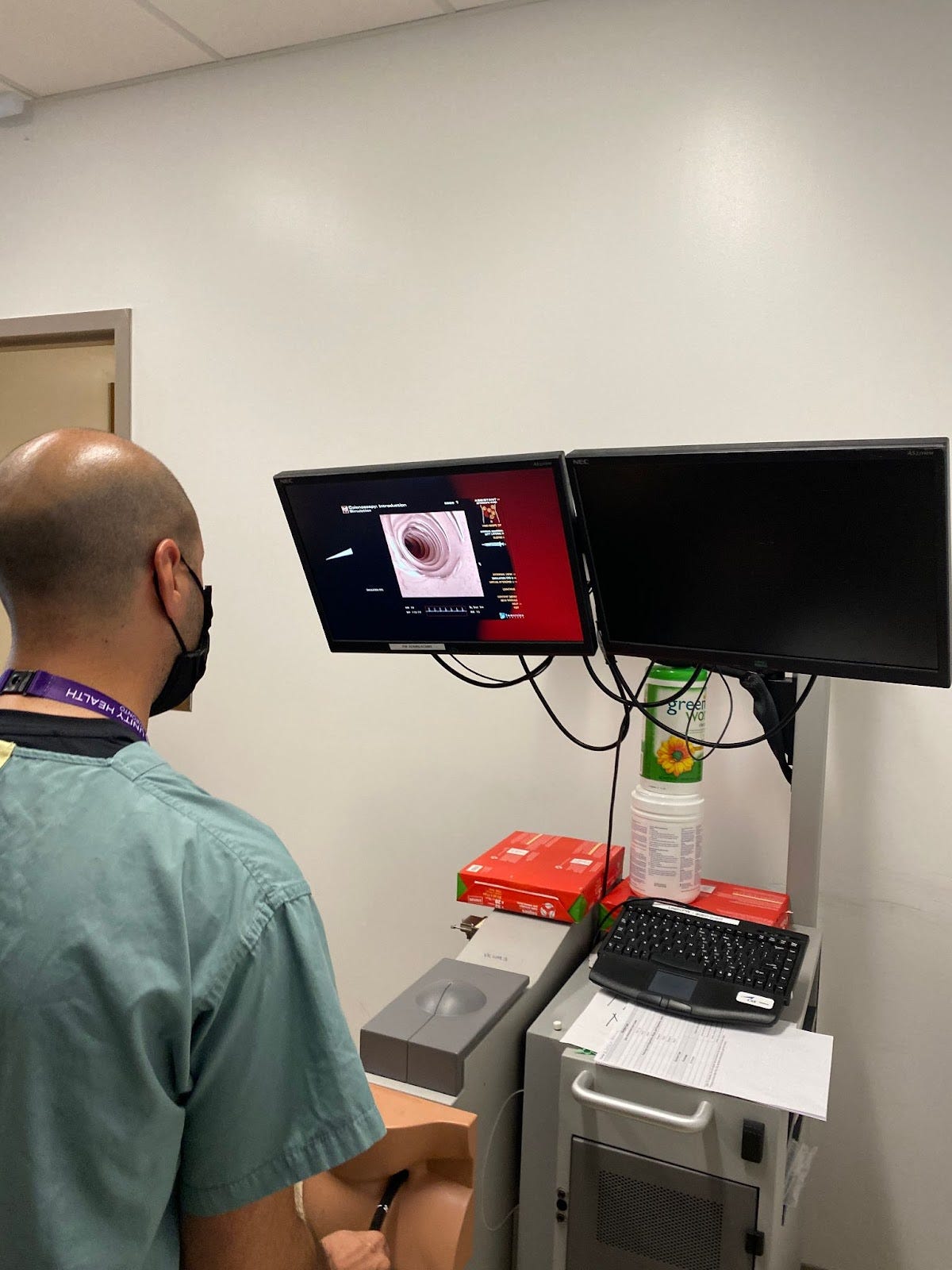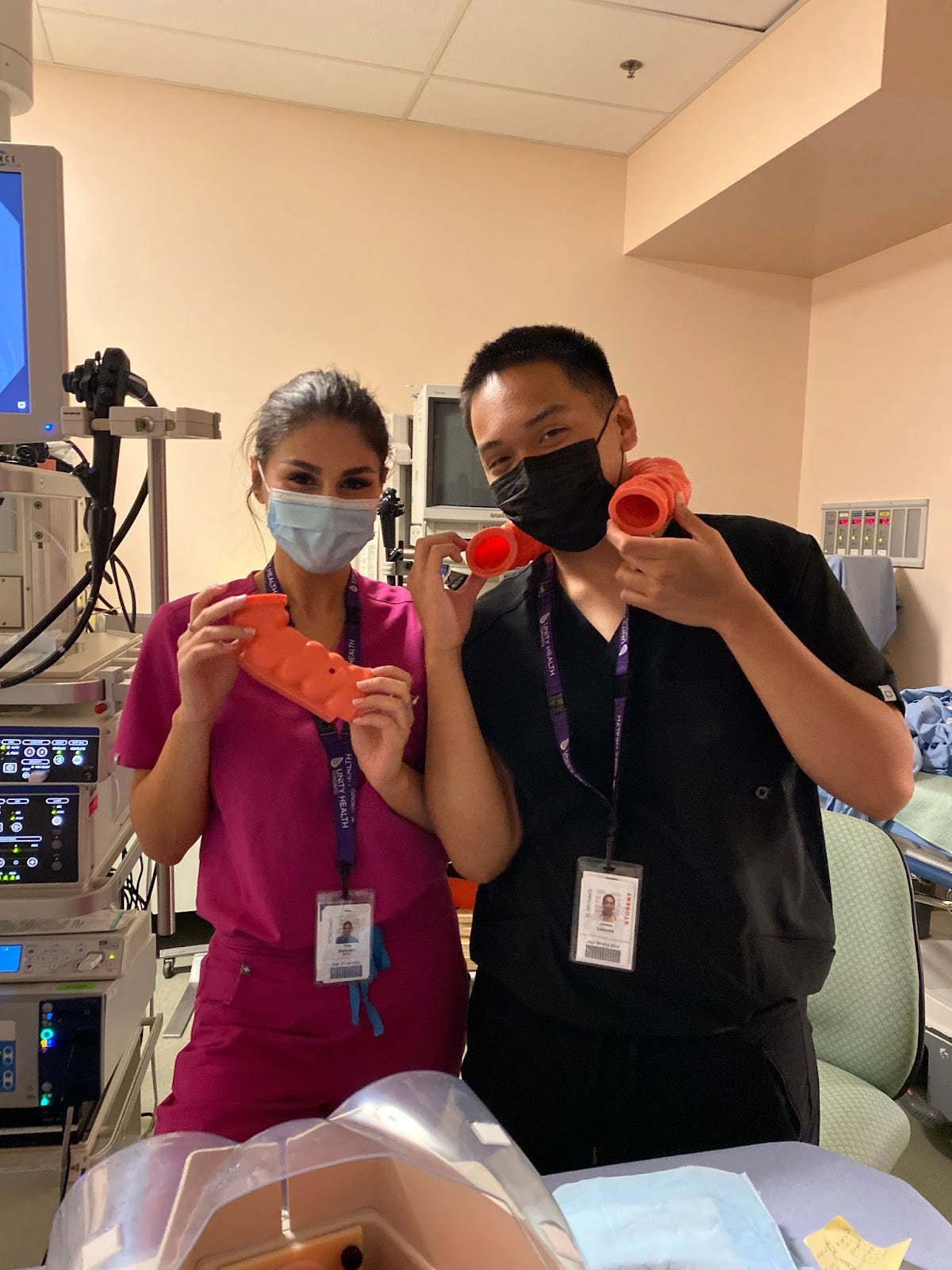Q&A with James Lisondra: Medical Education, Keenan Research Summer Student at the Grover Lab, & more 📝
Learn about James's experience as a Keenan Research Summer Student at St. Michael’s Hospital, in the Grover Lab!
Welcome to the Invite Health newsletter. These newsletters will contain a roundup of student opportunities related to Canadian healthcare, including jobs, organizations, events, and more! We also highlight and interview students making an impact in Canadian healthcare. 💌
This week, I invited James to share his experiences as a Keenan Research Summer Student (KRSS) at St. Michael’s Hospital. James specifically works in the Grover Lab, a gastroenterology and endoscopy education research laboratory that works with the gastroenterology program at the University of Toronto. Read on to learn more about his experience.
P.S. if you want to read more about the KRSS program, we also did an interview with another KRSS student, Demi Callisto!
Q&A with James Lisondra, Keenan Summer Research Student at the Grover Lab ✏️
First off, tell us about yourself! What inspired you to enter your current field of study, where do you go to school, and what are your aspirations? What else do you like to do outside of studying?
Hello there! My name is James Lisondra (he/him), and I’m a current third-year Life Sciences student at Ontario Tech University. For many of you, this may be the first time you are hearing of this university and that’s alright! As Ontario’s newest university, Ontario Tech is a small research & technology-driven institution in the heart of the Durham Region. Personally, I chose this school for its proximity to South Oshawa, an inner city region victimized by poor health infrastructure, underfunded schools and the opioid epidemic. In the future, it is my hope to go into a field that alleviates the health burdens of those living across Simcoe and Memorial Park, many of those unhoused, who look to the healthcare system for refuge. Through Ontario Tech, I’ve had the unique privilege of blending an education in the biological sciences with hands-on experience and knowledge-sharing on the diminishing impacts of the opioid crisis on Oshawa and the Durham Region. Outside of school, my free time is usually occupied through digital illustration and graphic design. I’ve always taken a strong interest in how virtual interfaces, typography, and design elements work together to convey a story. Fortunately, I’ve had the chance to collaborate with various student-based organizations across Ontario to build up their social media presence.
What experience are you going to highlight in this newsletter?
I’m here to share a little bit about my experience as a Keenan Research Summer Student at St. Michael’s Hospital over the last 2 summers! Through this volunteer experience, I’ve worked full-time (40 hours/wk) as a student in the Grover Lab, a medical education and critical appraisal-focused dry laboratory that is connected to the Gastroenterology Fellowship program at the University of Toronto. So far, I’ve worked through a hybrid format, spending most of the week doing online projects and visiting Toronto & St. Mikes on the rest. The Keenan Research Program is a unique opportunity for undergraduates to gain hands-on research experience in a clinical or non-clinical setting. There is a wide variety of investigators working within diverse fields at the Li Ka Shing Knowledge Institute, the research division of St. Michael’s Hospital.
How did you come across this opportunity? What did the application process entail?
I came across this opportunity in high school when I was searching for various undergraduate research opportunities to explore once I got to university. To begin your application, you should look through the St. Michael’s Hospital staff directory to read about the research contributions of various investigators at the Li Ka Shing Knowledge Institute. With a blossoming interest in pursuing a career related to gastric diseases and endoscopy, I applied to various GIs across St. Michael’s. After submitting the required application form, a CV, transcript, cover letter and introductory email to principal investigators, I participated in an interview and was offered a position in April.
What were some of the most notable highlights that you had from the experience?
This opportunity allowed me to explore unique aspects of medicine that undergraduate students don’t often get exposure to. This experience began my deepening passion for medical education and the life-long learning tools institutions and hospitals use to further physician competence and provide stronger patient care.
First, we ran the Endoscopic Simulation Course for incoming resident physicians in their post-grad year 4 (PGY4) within UofT’s GI fellowship, helping novice endoscopists gain vital polypectomy and GI tract visualization techniques that they will use throughout their careers. My first research project in collaboration with other students focused on optimizing simulated cost-effective polyps for use within the training program. These polyps were made by mixing agar, sugar, hot water, glycerol and other key ingredients, providing realism and educational feasibility.
Next, I got to use some of my video design skills to co-direct the annual GI Fellowship introductory video. This was a semi-serious, but even more comedic, take on the traditional welcome message from Staff Gastroenterologists to incoming fellows.
Finally, one of the biggest highlights relates to the people that I’ve met and continue to hold close to me, whether it was other undergraduates, medical students, residents or attendings. They all continually inspire my path forward and push me beyond what I believe is possible.

Did this experience lead you to pursue any other related opportunities?
Absolutely! The skills gained from this experience were transferable to my second undergrad summer where I worked under Ontario Tech’s Undergraduate Research Award. The various skills I gathered through the KRSS program such as hypothesis, protocol, search strategy development, or manuscript presentation and preparation, guided me through my employment as a Research Assistant in the Faculty of Health Science. Presently, I continue to volunteer with the Grover Lab, supporting on-going projects focused on appraising medical literature published during COVID-19 or designing visuals and diagrams for published studies. Interestingly, this opportunity led to my current role in the Grover Lab working on a retrospective registry that is set to launch in a few months.
Where can students go if they want to learn more about this program?
If you are currently an undergraduate student and looking to kickstart your research journey, I highly recommend the Keenan Research Summer Student program! This is an incredible chance to learn more about clinical and non-clinical research methods and start considering which subspecialties to pursue as a physician or other health practitioner. The supervisors within the KRSS program are incredibly receptive and constantly champion your career and personal growth. It is also a valuable resource to branch off into other opportunities and build your skills, network and experiences that will be central to any career you pursue. You can visit research.unityhealth.to/future-students-trainees/summer-student-krss-program to learn more about this opportunity. Applications have already opened & there is no set deadline, just try to apply AS EARLY as you can before spots fill up!
If you have any questions or need help with your application, feel free to message me on LinkedIn anytime: linkedin.com/in/jameslisondra/. You can also learn more about the work of the Grover Lab at groverlab.ca
Is there anything else that you would like to add for Invite Health readers?
One of the most important insights gained from my experience as a KRSS student is recognizing that medicine and health is more than just the physical burden, condition or illness. When a patient walks into your practice and describes their concerns to you, the subsequent treatment plans they go through are guided by so much more than medication. Ensuring physicians are equipped with the right knowledge and skills to prescribe a particular therapy is central to that person’s ability to overcome their illness. Medical education, continual physician evaluation, and quality improvement projects ensure practitioners go through continuous life-long learning. Through the KRSS program and exposure to the tools and methods used to train physicians, I learned that medicine is a career where so many interests and disciplines come together.

About Invite Health 💌
Invite Health is on a mission is to invite students to learn and participate in Canadian healthcare.
We write newsletters that feature a roundup of student opportunities (jobs, events, organizations, etc.) related to Canadian healthcare. We also interview students making an impact in Canadian healthcare.
More exciting things are coming soon, so stay tuned! 👀
How you can support Invite Health 🤝
Subscribe to our newsletter
Share Invite Health with your friends
Send any student opportunities (jobs, events, organizations, etc.) related to Canadian healthcare to Sachi, for a chance to be featured in the newsletter
Suggest any feedback on how we can improve Invite Health by contacting us on any of our social media platforms






